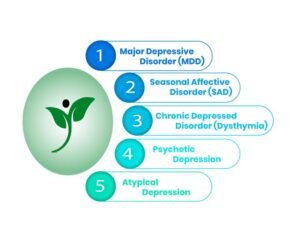A prevalent and serious psychiatric disorder, also popularly referred to as major depressive disorder or unipolar depression, is a psychiatric disorder that is characterized by sorrow at the majority of times and hopelessness, as well as loss of enthusiasm in any regular activities. It also has no mania or intense mood fluctuation, but a single mood, not bipolar.
The disorder could affect the way a person thinks, experiences, and even performs, and bring about any physical and emotional problems that prevent the working process, interpersonal relationships, and feelings. It may exhibit such manifestations as exhaustion, problems with the diet or sleep schedules, loss of concentration, and uselessness. The cause of it, however, has remained to vary, although genetics, brain styles, and life events usually evoke the trigger.
What Is Unipolar Depression?
Unipolar depression can be explained as a mental illness whereby the depressed individual does not have hope or emptiness for a long period of time. It is said to be unipolar because the mood swings are on the negative side, contrary to a bipolar disorder that alternates between the upsurge and the urge. Furthermore, they do not automatically resolve and may influence the work, relations, and overall well-being.
Thus, it is valuable to know that it is not just sadness for a few days, as in unipolar depression. Moreover, it is in most instances a condition that requires the services of a professional medical practitioner, such as therapy or medication, to assist one in dealing with the symptoms and enhance the quality of life. Consequently, friends, family, or mental health practitioners will be in a position to contribute to the recovery process. Lastly, by treating them appropriately, most individuals would alleviate their symptoms and would feel some degree of balance and hope again.
Unipolar Depression Symptoms
The following are the symptoms of unipolar depression:
- Constant melancholy, emptiness, or hopelessness.
- Interest/pleasure in common activities.
- Excessive alterations in weight or appetite.
- Problems with sleeping or excessive sleepiness.
- Inability to concentrate or make decisions.
- Sense of insignificance or too much guilt.
- Morbid thoughts of death or suicide.
How Long Does Unipolar Depression Last?
Unipolar depression may take various durations of time depending on the individual, the intensity of the symptoms, and the kind of treatment that the individual receives. In most instances, a depression episode can go on for many months or even years without treatment. Nevertheless, in case individuals seek professional assistance at an early stage, it is possible to begin to get better within a few weeks.
Additionally, most individuals will record slow improvements under a proper approach to the treatment process through therapy, medication, or both. As time passes, both the mood and energy level will improve throughout the treatment. Thus, adhering to the scheme and remaining in touch with mental health specialists, it is essential to avoid further outbursts and become stable on the long-term emotional level.
Unipolar Depression Vs Bipolar Depression
| Unipolar Depression | Bipolar Depression |
| A mood disorder with constant cases of depressive episodes and no manic or hypomanic episodes. | A temper disorder characterized by swirling absolute depression with either mania or hypomania. |
| No more than depressive states-regions of despondency, despair, and boredom. | Both depressive and manic/hypomanic episodes—periods of extreme highs and lows. |
| Often begins in late teens or early adulthood. | Typically starts in late adolescence or early adulthood, but can appear earlier. |
| Genetics, chemical imbalance, chronic stress, trauma. | Genetics, chemical imbalance, major life stressors; strong hereditary component. |
| Primarily antidepressant medications (SSRIs, SNRIs) and psychotherapy. | Mood stabilizers (lithium), antipsychotics, and sometimes antidepressants. |
How Does Unipolar Depression Affect Daily Life?
Unipolar depression may impair normal life by reducing the levels of energy and motivation to even the simplest of activities. Consequently, waking up, cooking, or going to work would appear tiring. Individuals may have problems with focus, and this may cause an error either in school or the workplace. Moreover, sadness and hopelessness will make them isolate themselves, cut down social life, and loneliness will occur.
In addition, sleep disruptions and loss of appetite are also observable in unipolar depression, which also influences the general health condition. As a good example, some individuals may be overly sleepy, and there are those people who lack sleep, and changes in eating mobilizations may either add or subtract weight. Consequently, the symptoms per se could lead to a vicious cycle, in which physical health problems worsen the agony of the emotional state.
Types of Unipolar Disorder

1.Major Depressive Disorder (MDD)
Unipolar disorder is mostly Major Depressive Disorder, which presents unending sadness, loss of strength, and a lack of interest in any activity in daily routines. People may also be burnt out by doing menial activities. One finds it hard to concentrate, and this may interfere with performance at work the workplace, or academic performance in school. Such indicators can become the subsequent factors of despair and loneliness. Hence, they require the relevant care and assistance to gain recovery and live a better life.
2.Chronic Depressed Disorder (Dysthymia)
Persistent Depressive Disorder is a persistent depressed mood that affects at least two years, although the symptoms might not be as severe as those of Major depression. For most of the day, people are likely to be fatigued, depressed, and irritated, which hinders relationships as well as productivity. However, it can have very serious emotional and physical stress over time. Hence, it is necessary to be capable of recognizing the symptoms and assign a specialist to make long-term changes.
3.Seasonal Affective Disorder (SAD)
The effect of Seasonal Affective Disorder is observed to go through specific seasons of time, and specifically winter, where the sun is scarce. People may feel unnaturally tired, depressed, or disassociated, and the energy may fall. Such a seasonal pattern can interfere with day-to-day life, labor, and social life. The symptoms usually disappear in spring or summer, although they can be recurrent every year. Therefore, treatment methods such as light therapy, counselling, or medicine could reduce the impact of the season.
4.Psychotic Depression
Psychotic depression refers to a frantic form of unipolar depression that incorporates major symptoms of depression and effects of psychosis, e.g., hallucinations or delusions. Human beings may hear voices, believe in something wrong, or become extremely paranoid. The symptoms are appalling and extremely hard to cope with in day-to-day life.
5.Atypical Depression
Atypical Depression has made the mood reactivity characteristic, which states that the mood of a person can briefly be elevated in reaction to positive occasions, contrary to typical depression. However, it is also combined with such symptoms as appetite, heaviness, and dormancy of limbs, and excessive sleep. These are perplexing to the viewers as a sign that it is not depression. The condition might eventually extend to relationships, work, and esteem. Therefore, it becomes noteworthy to manage these unique symptoms using treatment, including therapy or specific medications.
6.Postpartum (Peripartum) Depression
Peripartum Depression is a serious depression disorder, because it affects pregnant women during the birth episode and is more critical and in greater quantity than the customary baby blues. New mothers develop extreme depression and anxiety, or even a deficiency of attachment with the baby. These kinds of emotions can interrupt attachment and normal care activity, leading to guilt and stress. Therefore, medical and emotional support is vital to get moms back to their normal condition and reintegrate them into a belonging condition.
Unipolar Depression Treatment Options
Medication Management
Unipolar depression is mainly treated using medication. The antidepressants include SSRIs, SNRIs, tricyclic antidepressants, and atypical antidepressants. They create an equilibrium of neurotransmitters such as norepinephrine and serotonin in the brain. The identification of proper medication and dose often takes scrutiny by a psychiatrist and a couple of more weeks to manifest into full effect. It is necessary to conduct regular follow-up visits to control and track progress and side effects.
Psychotherapy
A certainty that cures the underlying existence of emotional and behavioral aspects of depression is in the form of psychotherapy or talk therapy. The goals of Cognitive-Behavioral Therapy (CBT) are the identification of the negativistic thought patterns and their replacement. The therapy sessions are accommodating due to the fact that they may be in groups, individuals, or even online. With the help of psychotherapy, individuals will be capable of managing stress further and preventing cases of depression in the future.
Lifestyle Changes
Depression is one of the conditions that can be greatly ameliorated through a healthy lifestyle. Exercise also releases endorphins, which have a natural side effect of improving mood and energy. A whole food diet is a great source of nutrients that are necessary for the brain. Regular sleep schedules help control mood, and people should avoid alcohol and recreational drugs as they increase the probability of exacerbating symptoms.
Support Systems
It forms an inseparable part of revival by having a support system. The peer support groups can provide a secure forum through which individuals can share their life events and get rid of the sensation of isolation. Individuals can also receive help in putting their social and professional lives into practice through professional counseling and community resources.
Bottom Line
Early writing of the symptoms of unipolar depression is important in providing support and managing treatment promptly. One should not overlook such early symptoms as continuous sadness, exhaustion, interests, or sleep and appetite changes. Mediations, psychotherapy, or a mix of both is often used, and this depends on the individual’s needs. Early intervention is useful not only in enhancing recovery outcomes but also in preventing future episodes.
With the ability to remain alert and find a rescuing hand, one can recover their balance, improve their quality of life, and support financial health in the long term. To learn more and get further information on mental health, follow the Mental Behavioral resources, and keep taking care of your emotional health.
FAQs
What is unipolar depression?
Unipolar depression is a mood disorder in which individuals experience and remain saddened, feel hopeless, and are uninterested in routine tasks. It also does not entail manic and hypomanic episodes, and unlike bipolar disorder, it never pertains to episodes of these.
What is the cause of the unipolar depression?
Genetic elements and a complex of chemical imbalance in the brain, chronic stress, trauma, or significant alterations in life may cause it. In some cases, medical conditions or some medicines can also be contributing factors.
What is the diagnosis of the unipolar depression?
A professional with mental health evaluates the symptoms by assessing the psychiatric evaluation, medical history, and occasionally laboratory examinations to eliminate other conditions.
What are the possibilities of treatment?
Interventions are mostly psychotherapy, medication like antidepressants, lifestyle changes such as exercising, a healthy diet, and stress relief interventions.
Is unipolar depression preventable?
It is not always preventable. A balanced lifestyle and coping with stress, aiming at the early treatment of the mentioned conditions, and having a strong support system can contribute to the minimization of cases of severe episodes.








